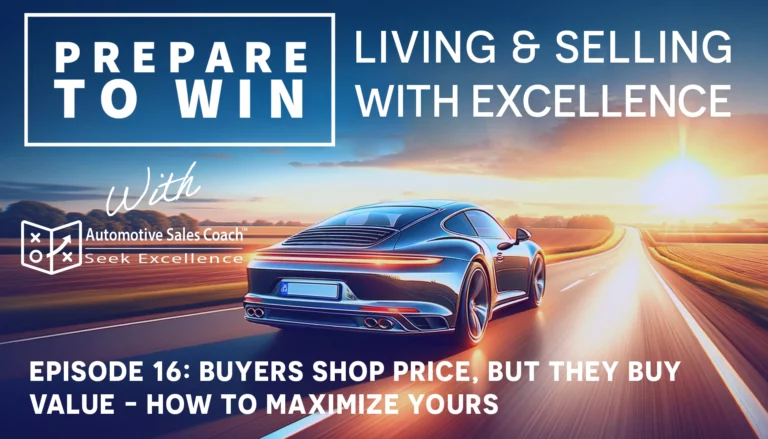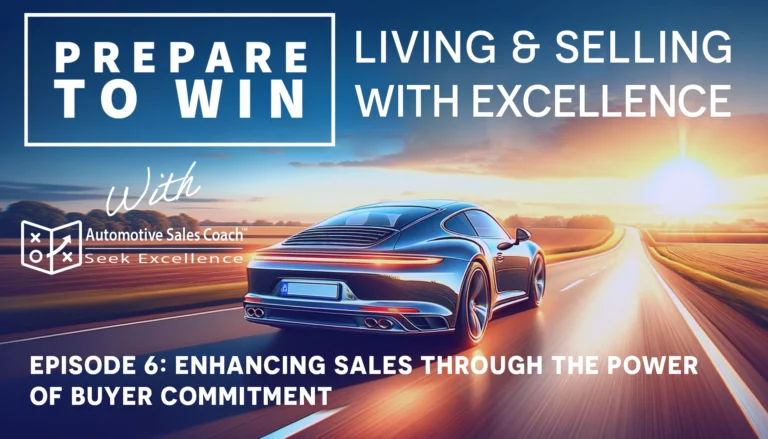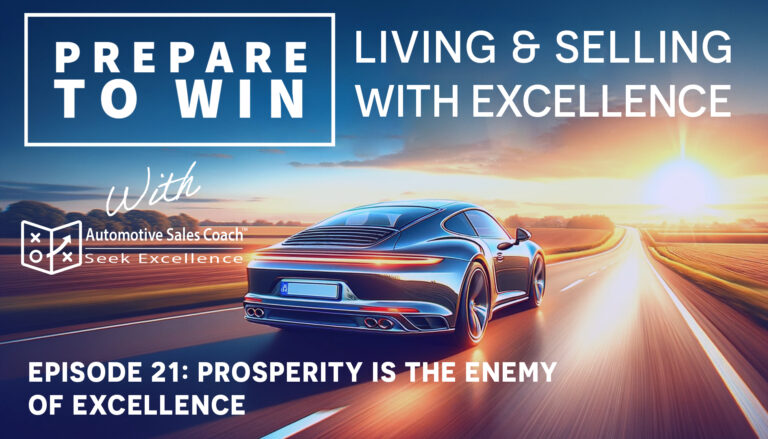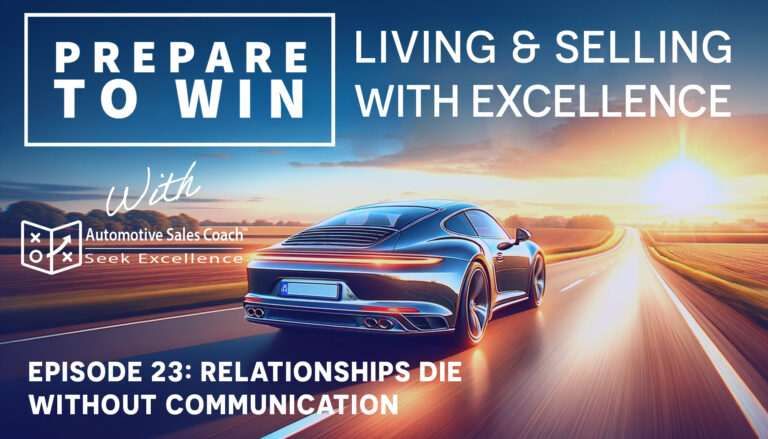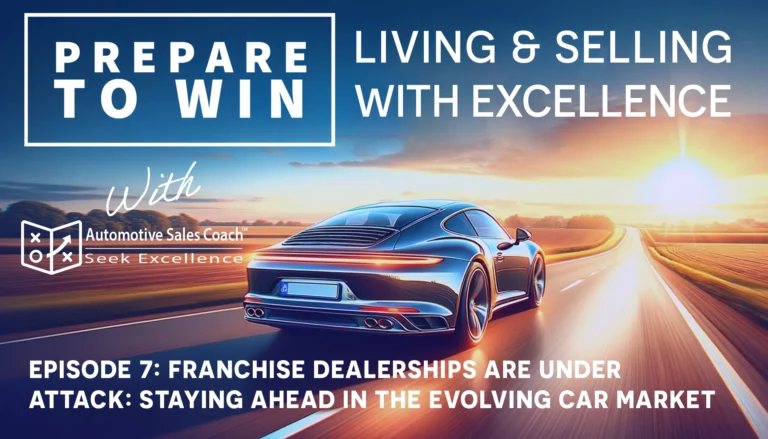Revolutionizing Sales with Understanding and Excellence
Do you truly grasp the difference between hearing and listening? Understanding this distinction can be a game-changer in your sales and personal relationships. In this episode, we spotlight the power of active listening. It’s often an overlooked component in sales training, but it’s an essential skill for building trust with buyers. Discover the art of understanding both verbal and non-verbal cues, and grasp how active listening can help you effectively address objections throughout the sales process.
But that’s not all! We want to guide you on how not just to sell, but sell with excellence. How, you ask? By understanding and building value for your product before even thinking of sealing a deal. We’ll let you in on the secrets of a successful product presentation that works for any product and how to transform a simple presentation into an exploration that stimulates desire for your offer. Tune into this episode to enhance your active listening skills, build stronger connections, and learn to skillfully construct value for product sales. It’s not just about selling; it’s about selling with a purpose and excellence. So, are you ready to revolutionize your sales approach?
David Lowe: 0:00
W elcome to Prepare to Win. We’re so glad you’re here. This podcast is all about giving you drive time tips about selling and living with excellence. Sometimes it’s living and selling with excellence. We’re glad that you’re here. Today’s episode is going to be about the power of active listening. It’s fantastic. We’re going to uncover the secrets of active listening and show you how you can use it to better understand your buyer and help you sell with excellence. Stay tuned.
Grace Lupoi: 0:40
So, David, talking about active listening, right? I think this really is one of the most important topics that is often never talked about, right?
David Lowe: 0:48
Right. So I think a lot of people think selling is telling. Right, Selling is telling and most salespeople talk too much. I’m sure that I do sometimes. I’m sure that we all do, and it’s really nice to have a reminder. That’s what this podcast is all about “Drive time tips, reminders on selling. on I think we have to be reminded constantly of what we believe. And we know, listening is the key to building relationships and trust. Listening is the key to understanding our buyer, not just what they want. More importantly, why they want it and how it fits their lifestyle. Family, work and play. It’s so important, yet it’s so neglected in training. Would you agree?
Grace Lupoi: 1:32
I agree, and that goes back to one of the first principles that we really teach on right Is to have influence with somebody, we have to first let them influence us. Right and that all comes back to how we actively listen to them.
David Lowe: 1:42
So that’s an age old principle going back 3000 years. It’s been said many times by many people in many different ways. But bottom line if you want people to pay attention to you, pay attention to them. Right? And listen, Let’s be honest today we struggle with our attention, don’t we?
Grace Lupoi: 2:00
I know I do.
David Lowe: 2:01
Paying attention is hard. It’s a skill set these days. So we’re going to talk about what active listening is and how it will help us sell with excellence. And, of course, I think in the last episode we really dug down into a formula for overcoming price objections. And I’m not sure if you haven’t downloaded your white sheet yet, go to prepare tow in. com and forward slash the episode you want and you can download the episode (guide). Kind of the key points and the takeaways and that formula for overcoming price objections. Is that, right? Now, one of the things that we didn’t really talk about, because these are 20 minute episodes I can’t squash everything but big topic. But really, if you don’t hear the objection, how can you handle it? And people say, how do I not hear the objection? Well, you’ve got to be listening, because objections just don’t happen during the close of the numbers. They can happen throughout the sales process or the buying process, can’t they? So we have to know, our buyers going to have objections. We have to know they’re coming up, but we have to hear them, don’t we? But more, today we’re not really talking about the negotiating process, although active listening is so important to that. We’re just talking about the skill set. Now, I think on the first episode we talked about who’s this podcast for. That’s why we didn’t say selling with excellence, it’s selling and what? Living. Yeah, we have so many salespeople that share their, our training with their spouse, male with their wife, female with their husband right, my husband could really use this, because our sales training overlaps life. We believe that excellence is a habit. We also believe that the skill sets, in selling in our chosen path to sales, automotive, those skill sets really transfer into helping us live with excellence. So if we actively listened would our work life, we become more effective at work?
Grace Lupoi: 4:01
Absolutely.
David Lowe: 4:02
Of course, right. Buyers feel more understood, they’re more likely to understand us and we have our chance to sell more for more money, right? We become more proud and our customers are happier and we have a healthy pride. What if we actively listen at home, right? Well, that looks like right. Have you found that? In conversations with your friends. You find that people are talking or listening these days?
Grace Lupoi: 4:25
Talking.
David Lowe: 4:26
Right. So we have a conversation, we’ll say something and people will take over. Isn’t that kind of normal? It’s kind of interesting to study. I love being a student of excellence and a student of people, a student of human behavior, because it’s awesome. We’re a weird people bad men, I think and so it’s really cool when we you know, I think it’s wisdom says, observing others. Enlightenment means observing ourselves, right? So I think we’re really here to talk about observing ourselves, not other people’s listening habits. Let’s work on ourselves first, but it’s a struggle. So there’s some things that we have to do. First of all, let’s talk about what active listening is. This is really important, because we’re always hearing, but we’re not always listening. So hearing.
Grace Lupoi: 5:13
Huge difference, yeah, hearing is passive. Right.
David Lowe: 5:16
Listening is active. You got to make a decision, right. I do. So what are you saying, grace? What are you trying to say and what are you not saying? Isn’t that what active listening is trying to determine?
Grace Lupoi: 5:28
Yeah, all three.
David Lowe: 5:30
So how good are communicators, do you think the average person is these days verbal? Not great so you know I love taking lines from TV. You know they spend hours and hours, days, maybe even right in the perfect line, and when I’m watching TV I probably make people crazy because I’m always stopping and go. That’s a great way to say that I love hearing people say things that I say, but they say it better, right, I’m not too proud to learn. I’m going to be better today than yesterday. So I hear it. I always stopped the TV, much to my wife’s dismay, and I write it down. I want it to be part of me and I don’t have a great memory for some things, but principle-based things and the way things are said seem to stick in my brain, right? So we’re talking about active listening not being part of our culture today, and we’re talking about we’re not worried about other people’s listening skills. We’re worried about our own listening skills, and one of the things that we have to first do is decide what is active listening. It is seeking to understand what the communicator is saying, trying to say, or maybe not say, saying that they didn’t sit for hours to craft their words.
Grace Lupoi: 6:51
I think that’s where that really comes in. Right Is that it’s so important, not just what they’re saying, what am I trying to say? Right? And that’s where I think becoming a student of excellence really comes in. And I’m not okay with just being mediocre. I don’t wanna just settle with that mediocrity and I don’t know what they’re saying and I don’t really care. How can I go above and beyond that to really understand who they are, what are they saying, what are they trying to say and how can I respond in a way that’s going to help them?
David Lowe: 7:16
That’s fantastic. So one of the things we always talk about is being naturally curious, and I think there’s a TV show recently on Apple about a soccer team in England and the coach said be curious, not judgmental. And it went viral because we all know that we don’t ask enough questions, we’re not actively listening and we all are making decisions almost on the spot right. So it became viral because it hit a nerve. So active listening is the cure. So in myself, I start with the knowledge that I really want to understand the person I’m talking to. So I have to focus. So when you go to lunch with a friend, do you take your phone and put it on the table? That’s a good practice. Right there You’ve made a decision yeah, leave it in the car. Is there really anything gonna happen in the next 50 minutes? That’s gonna change your world if you don’t pick it up Now. If you’re a sick kid at home, it’s one thing, but 90% of the time, do you really need to be distracted constantly? Can’t we consciously remove distractions that keep us from active listening? So one of the first things we should do is what Focus, and that might require us to remove some distractions right. So we make this active listening. So, active listening when we hear. One of the things that we need to do is, when we hear something is, let the person we’re with know it. What do we call that?
Grace Lupoi: 8:40
Affirmation.
David Lowe: 8:41
Affirmation. So give me an example. So anyway, great. So my daughter just started college and I was kind of psyched and so I need to get a car from her.
Grace Lupoi: 8:50
You got her started college.
David Lowe: 8:51
So, all right, an affirmation can be as simple as what.
Grace Lupoi: 8:55
Another question even right. I can touch on. Hey, you mentioned daughters in college, that’s awesome, yeah.
David Lowe: 9:00
So Grace repeated what I said in a different way. Now, if we’re face to face, affirmations can be physical as well shaking your head. As a sales consultant, I always wrote down things people said during the understand goals, when I was seeking to find out what they wanted, why they wanted, how it fit their life. I always wrote down the things I heard. That had helped internalize it for me and it let them know what I’m listening. I hear you. What you have to say is important. Active listening requires us letting the speaker know that we’re listening, because what they’re saying is important. By am I not also saying if what you’re saying is important, you must be important? Right, the power of active listening is putting the other person in a position of importance, letting them know. Is that true?
Grace Lupoi: 9:54
And when I feel important right. I value you as my consultant.
David Lowe: 9:58
Isn’t that amazing how it works.
Grace Lupoi: 9:59
That creates that bond, that, hey, I like you and, by the way, I’m gonna buy from someone that I like.
David Lowe: 10:04
So I feel listened to, I wanna listen to you, I feel respected, I wanna respect you. It really goes both ways. So we change the world by changing ourselves and we work on this affirmation. It’s a manifestation of what I’m trying to do here. I really wanna understand you, I wanna know you, you’re important to me, I value you. That’s what affirmation so we would say for active listening. We definitely have to focus, we have to move with distraction, but oh, we really have to slow down and maybe, before asking the next question, maybe we need to affirm that we heard them. Now can we use what we heard to ask even a better question?
Grace Lupoi: 10:49
Absolutely.
David Lowe: 10:50
That’s for the whole point of this right Active, listening to understand and then to dive deeper and my daughter’s at college. You now affirm that you know that you might ask a question like Wow, tell your daughter go into college, yeah yeah, so we might say right, tell me about your daughter at college. Where’s she going? What’s she studying? Now, I’m not gonna have a in a sales situation like selling cars. What we do, we have these conversations. We get in and out Because we don’t have a 40 minute conversation, but I do wanna show, wow, so well, congratulations, go into college. That’s a big thing. What is your major? Oh, where’s she going? Okay, so she’s away from home. How do you guys feel about that? All right, so let’s get back to. Let’s talk about the car for your daughter. What’s important? It right. And so I can ask the next good question Based on what I heard. So active listening really requires seeking to understand what are buyers saying, not saying trying to say, because people don’t take time to communicate. It requires us to remove distractions and focus, and it really to do it Well. We have to let them know. We hear them right. Once we hear them, we use what we heard to ask a logical follow-up question.
Grace Lupoi: 12:02
There’s a reason, obviously, that someone would share about their daughter. What they’re secretly saying is what ask me about my Daughter?
David Lowe: 12:09
that’s right.
Grace Lupoi: 12:10
No one just mentions, oh yeah, I’ve got three dogs. Oh yeah, I’ve got a daughter in college. No one mentions those side things without really saying. Let me talk about that.
David Lowe: 12:18
Isn’t it funny? So it was reminding me a story of Reese Nichols, when I was at the watch store getting my watch fixed and a guy of means came in right and older guy of means came in and A clerk came up to him that I guess they’re probably called consultant, but she acted like a clerk that day. She looked apart. So you know how can I help me? He says I’m looking for watch for my son. Can I see that Breitling? Absolutely. She took it out and handed it to him and he looked at it for a while and he said yeah, I’ll take it, can you wrap it up? And she said absolutely, I guarantee. She walked in the back room and said sold it, and I’m just cracking up, I’m watching from afar, right. So I’m kind of I want to, I’m kind of curious. So you curious guy naturally cure. So I go up to the guy and I said, hey, are you adopting? And I was only like a 10-year differential, still right. And he starts laughing. I said, man, that’s a cool gift for your son, right? What did he do to earn that gift to the special occasion? And that’s all I had to ask. And he told me everything about his son son moving home, joining the family practice. This was a welcome. He wanted to make your point. He really wanted to brag and share. Right, it’s so, it’s, it’s, it’s really. Sometimes I get depressed when I see salesman Miss the opportunity to connect. Unfortunately, sometimes they do things poorly and still make the sale so they don’t learn.
Grace Lupoi: 13:48
Why should I get better? I can still make the money, that’s right.
David Lowe: 13:51
They’re probably gonna stay clerks the whole life in us in a professional sales job. And you know, if you’re nice and you work hard and the market brings you opportunities, sure you can make a living. So none of our training at Automotive sales coach or our dealership playbook, certainly none of our stuff at prepare to win is about just getting by. It’s about working and living, selling and living with excellence, about pursuing your best self Butter today Than yesterday, right, so she was happy with the sale. I would have wanted the customer for life, right, I guarantee he comes in, buys another watch. Why ask for her? She’s nothing special. Had she taken that opportunity, he fed her, he fed her right and if you take that opportunity to have happen. So Active listening requires asking good follow-up question. I heard you, you’re important to me and I want to know more. That’s really what it is, isn’t it? So we talked about active listening here today and we know that selling a lot of salesmen confuse selling with telling, and so in this episode we just wanted to break down we’re gonna be talking about this a lot Throughout the different skill sets that sales people need, from overcoming objection, negotiating, presenting the product, understanding goals, so many of the things in our episodes are gonna include what? Active listening, because it’s really one of those key skills that Goes through our life and I’d like to talk to it at home, right, so can we use this, talk about it at home? Can we use the same skill set at home?
Grace Lupoi: 15:32
Absolutely, we can’t.
David Lowe: 15:34
How would it benefit us at home if we did that?
Grace Lupoi: 15:37
same way. Right, it’s gonna help deepen those relationships deep in that connection and again, less of the person know I care about you.
David Lowe: 15:44
So sometimes we can take the people closest to us for granted and we become, we play ping-pong with them all the time. We never slow down to let them know I value you, I value what you’re saying, I value your opinion Doesn’t mean I’m gonna agree or go that way, but certainly if I love them, can I not show them the respect of a little attention and a little affirmation, right? So this isn’t just for selling. So if you’re in the sales career, active listening is a skill you want to develop. If you’re a live, active skin, listening is a skill set you want to develop for living with your friends and your neighbors and your coworkers and your family better right, living with excellence, all right, dave.
Grace Lupoi: 16:29
So that kind of wraps up today’s episode right. Active listening, we know is so important. We’ve got to make sure we stay intentional on that skill set.
David Lowe: 16:36
Great word, intentional, I agree Awesome.
Grace Lupoi: 16:38
So thank you guys for joining us today. Really appreciate that Again. Our goal is to continue to serve you guys and help you guys be better today than yesterday. So if we are a benefit to you, please like, follow, subscribe to wherever you get yours. We want to continue that partnership with you.
David Lowe: 16:51
Well, we really appreciate that. We really appreciate your time. We know how valuable your time is. Thanks for joining us. Listen, in the next episode you’re going to want to be here. We’re going to talk about the secrets of a product presentation. Now we’re in the car business, so you might call it a vehicle walkaround, but we’re going to talk about how we turn that into an exploration, how to build value and desire in your product. Now, not just if you’re selling cars any product that you sell, you want to build value and desire for it before you ask for the sale. Right, we’re going to give you the secrets that are going to help you live and sell with excellence. See you next time.



